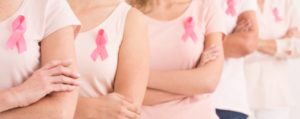 HYANNIS – When people hear the word breast cancer, they think it is one disease. In reality, breast cancer has many different forms and each of them responds differently to treatment. In the past, even doctors didn’t understand all of the nuances, and therefore couldn’t accurately predict who would remain cancer-free and who would see their cancer return.
HYANNIS – When people hear the word breast cancer, they think it is one disease. In reality, breast cancer has many different forms and each of them responds differently to treatment. In the past, even doctors didn’t understand all of the nuances, and therefore couldn’t accurately predict who would remain cancer-free and who would see their cancer return.
Now, thanks to new technology over the past few decades, that is no longer true. There are now tests that help doctors to better personalize treatment to fit each individual patient.
“Currently, when a woman is diagnosed with breast cancer, her tumor will be stained for three things,” explained Cape Cod Hospital oncologist Jennifer Crook, MD, in a recent interview. “These are the HER2 neu-protein, the estrogen receptor, and the progesterone receptor. Those are three important factors that we are looking at when we are determining what kind of treatment a patient should get.”
Approximately 30 percent of women with breast cancer are HER2-positive, Dr. Crook said. The discovery of the protein formerly meant a poorer outcome, as HER2-positive cancers are aggressive and associated with a higher rate of recurrence.
One of the biggest breakthroughs in recent years is the development of the drug trastuzumab (Herceptin). In 2006, the FDA approved it as part of an adjuvant therapy (after surgery) for women with HER2-positive breast cancer. Two major trials showed it reduced the risk of recurrence by more than 50 percent.
Could Hear a Pin Drop
Dr. Crook was at the American Society of Clinical Oncology (ASCO) annual meeting the year the original adjunct Herceptin data was presented.
“You could have heard a pin drop,” she said. “We’re talking about a meeting with thousands of people, the rooms are rarely quiet. It was probably the biggest impact we’ve ever seen associated with one drug, at least in recent memory. It was really phenomenal.”
Now a woman with HER2 positive breast cancer gets 12 months of treatment with Herceptin. With this treatment, her recurrence risk can be lowered to at least the level of someone with HER2-negative disease, and Dr. Crook said some studies have shown it to be even slightly better.
When the other two protein markers, estrogen receptor (ER) and progesterone receptor (PR), are positive it indicates that those hormones are the fuel for the tumor growth. In those cases, oncologists put the patient on a drug like tamoxifen or anastrozole, which lower the estrogen levels in her body. These medications also lower the risk of recurrence by about half, Dr. Crook said.
HRT Involvement
The estrogen that drives certain tumors can either occur naturally in the body or be the result of hormone replacement therapy. Doctors freely prescribed estrogen replacement therapy to women going through menopause who complained of hot flashes back in the 90s, Dr. Crook said. Not only did doctors prescribe the estrogen, they also let women take it indefinitely.
That practice changed in the early 2000s when two Women’s Health Initiative randomized control trials found a strong link between hormone replacement therapy and breast cancer. Both hormone trials (estrogen alone and an estrogen and progesterone combination) ended early because the test statistic for risk exceeded the benefits of continuing after 5.2 years. There was no associated risk of an increase for breast cancer for the first four years of the trial.
If a woman is experiencing symptoms of menopause that are affecting her quality of life, doctors may still prescribe the treatment, Dr. Crook said. But she cautioned that the prescribing doctor should make sure the patient is well aware of the risks.
When doctors prescribe estrogen therapy these days, it is usually at the lowest dose possible for the shortest duration during the height of menopause symptoms.
The decision about whether to take estrogen is an individual choice that should be discussed with your doctor, Dr. Crook said.
“It’s really tough because theoretical risk is hard to balance against quality of life,” she said. “If you’re having miserable hot flashes and you’re not sleeping at night, the risk of possibly getting breast cancer one day might seem acceptable. Until you get it. Then it becomes another whole picture.
























